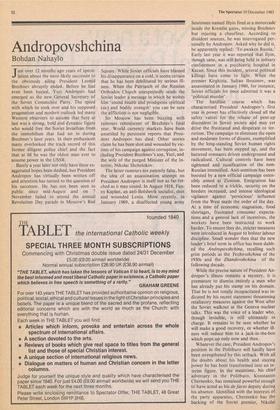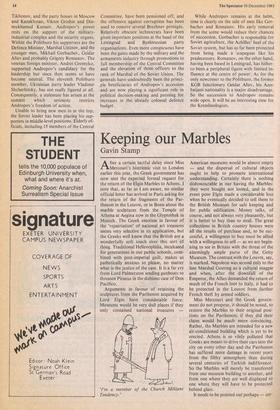Andropovshchina
Bohdan Nahaylo
Just over 12 months ago years of specu- lation about the most likely successor to the obviously ailing President Leonid Brezhnev abruptly ended. Before he had even been buried, Yuri Andropov had emerged as the new General Secretary of the Soviet Communist Party. The speed with which he took over and his supposed pragmatism and modern outlook led many Western observers to assume that here at last was a strong, bold and dynamic figure who would free the Soviet leviathan from the immobilism that had set in during Brezhnev's later years. In their enthusiasm many overlooked the track record of this former diligent police chief and the fact that at 68 he was the oldest man ever to assume power in the USSR.
Barely a year later not only have these ex- aggerated hopes been dashed, but President Andropov has virtually been written off and attention has turned to the question of his successor. He has not been seen in public since mid-August and on 7 November failed to attend the annual , Revolution Day parade in Moscow's Red Square. While Soviet officials have blamed his disappearance on a cold, it seems certain that he has been debilitated by serious ill- ness. When the Patriarch of the Russian Orthodox Church unexpectedly sends the Soviet leader a message in which he wishes him `sound health and prodigious spiritual (sic) and bodily strength' you can be sure the affliction is not negligible.
So Moscow has been buzzing with rumours reminiscent of Brezhnev's final year. World currency markets have been unsettled by persistent reports that Presi- dent Andropov has died. Other stories claim he has been shot and wounded by vic- tims of his campaign against corruption, in- cluding President Brezhnev's son, Yuri, and the wife of the purged Minister of the In- terior, Nikolai Shchelokov.
The latter rumours are patently false, but the idea of an assassination attempt on President Andropov is itself not as far-fet- ched as it may sound. In August 1918, Fan- ny Kaplan, an anti-Bolshevik socialist, shot and wounded Lenin. More recently, in January 1969, a disaffected young , army lieutenant named Illyin fired at a motorcade inside the Kremlin gates, missing Brezhnev but injuring a chauffeur. According to dissident sources, he was interrogated per- sonally by Andropov. Asked why he did it, he apparently replied: `To awaken Russia,' Early last year it was reported that Ilyin, though sane, was still being held in solitary confinement in a psychiatric hospital in Kazan. Since this incident, several political killings have come to light. When the premier Kirghizia, Sultan Ibraimov, was assassinated in January 1980, for instance, Soviet officials for once admitted it was a `political murder'.
The hardline course which has characterised President Andropov's first year in power has effectively closed all the safety valves for the release of pent-up discontent in Soviet society and may yet drive the frustrated and desperate to ter- rorism. The campaign to eliminate the open and moderate forms of dissent, exemplified by the long-standing Soviet human rights movement, has been stepped up, and the battered remnants driven underground and radicalised. Cultural controls have been tightened and russification of the non- Russian intensified. Anti-semitism has been boosted by a new official campaign osten- sibly aimed at Zionism. Emigration has been reduced to a trickle, security on the borders increased, and intense ideological vigilance against `pernicious' influence from the West made the order of the day. At a time of economic stagnation, food shortages, frustrated consumer expecta- tions and a general lack of incentives, the workers have been instructed to work harder. To ensure they do, stricter measures were introduced in August to bolster labour discipline. Small wonder then that the new leader's brief term in office has been dubb- ed the Andropovshchina, recalling such grim periods as the Yezhovshchina of the 1930s and the Zhandovshchina of the following decade.
While the precise nature of President An- dropov's illness remains a mystery, it is premature to dismiss entirely a man who has already put his stamp on his domain. That he is not totally incapacitated was in- dicated by his recent statement threatening retaliatory measures against the West after the Soviet walkout at the Geneva nuclear talks. This was the voice of a leader who, though invisible, is still ultimately in charge. It remains to be seen whether he will make a good recovery, or whether ill- ness will reduce him to a jack-in-the-box which pops up only now and then.
Whatever the case, President Andropov's position in the Politburo will hardly have been strengthened by this setback. With all the doubts about his health and staying 'power he has been transformed into an in- terim figure. In the meantime, his chief adversary in the Politburo, Konstantin Chernenko, has remained powerful enough to have acted as his de facto deputy during his absence. Identified with the interests of the party apparatus, Chernenko has the backing of the Soviet premier, Nikolai
Tikhonov, and the party bosses in Moscow and Kazakhstan, Viktor Grishin and Din- mukhamed Kunaev. Andropov's power rests on the support of the military- industrial complex and the security organs. Within the Politburo his supporters are the Defence Minister, Marshal Ustinov, and the younger men, Mikhail Gorbachev, Geidar Alio/ and probably Grigory Romanov. The veteran foreign minister, Andrei Gromyko, supported Andropov's candidacy for the leadership but since then seems to have become neutral. The eleventh Politburo member, Ukrainian party leader Vladimir Shcherbitsky, has not really figured at all. Consequently, a stalemate has arisen at the summit which seriously restricts Andropov's freedom of action.
Unable to bring new men in at the top, the Soviet leader has been placing his sup- porters in middle-level positions. Elderly of- ficials, including 15 members of the Central
Committee, have been pensioned off, and the offensive against corruption has been used to remove several Brezhnev protégés. Relatively obscure technocrats have been given important positions at the head of the Leningrad and Byelorussian party organisations. Even more conspicuous have been the gains made by the military and the armaments industry through promotions to full membership of the Central Committee and the elevation of three officers to the rank of Marshal of the Soviet Union. The generals have undoubtedly been the princi- ple benificiaries of Andropov's accession and are now playing a significant role in political decision-making and pressing for increases in the already colossal defence budget.
While Andropov remains at the helm, time is clearly on the side of men like Gor- bachev and Romanov. His early removal from the scene would reduce their chances of succession. Gorbachev is responsible for Soviet agriculture, the Achilles' heel of the Soviet system, but has so far been protected from being made a scapegoat like his predecessors. Romanov, on the other hand, having been based in Leningrad, has hither- to been a peripheral figure with limited in- fluence at the centre of power. As for the only newcomer to the Politburo, the former KGB functionary Geidar Aliev, his Azer- baijani nationality is a major disadvantage. So the succession to Andropov remains wide open. It will be an interesting time for the Kremlinologists.















































 Previous page
Previous page